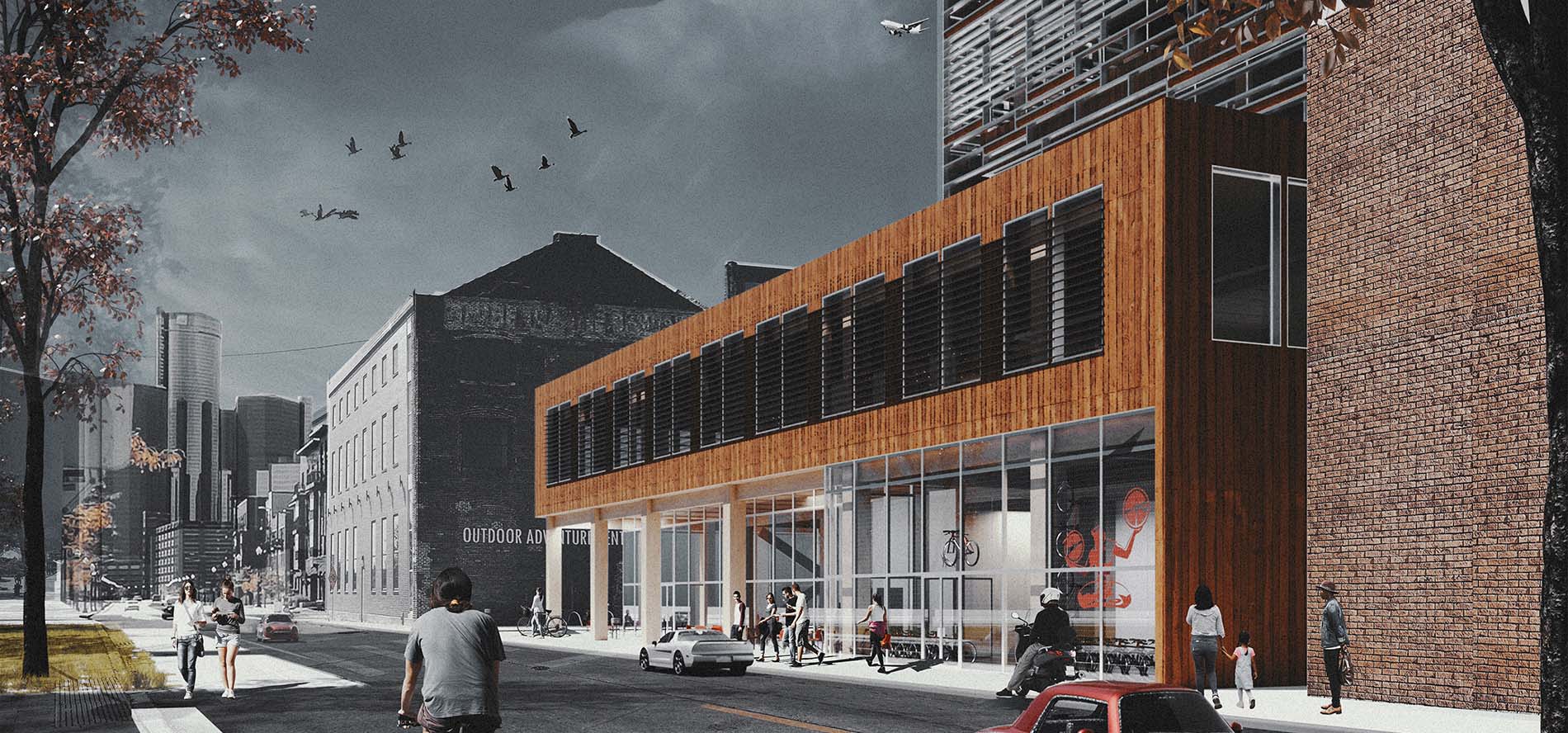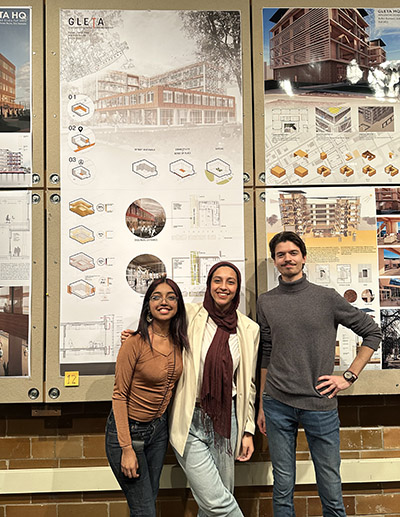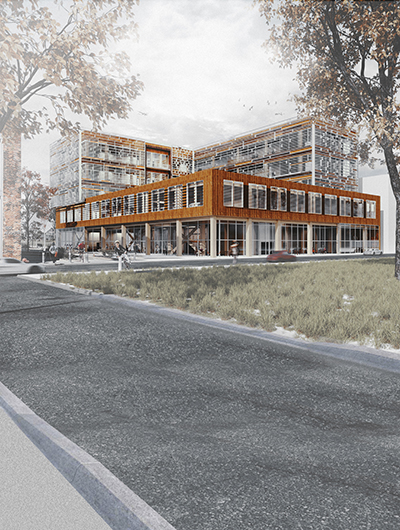Architecture students recognized after winning international competition

A project that started out with a simple L-shaped building led to international recognition for three University of Detroit Mercy School of Architecture & Community Development students.
Dolin Diaz ’23, Farah Ossaimee ’21, ’23 and Marcus Puste ’23 were among the winners of this year’s American Institute of Architects Committee on the Environment (AIA COTE) Top Ten for Students Competition.
 Held in partnership with the Association of Collegiate Schools of Architecture (ACSA), the competition recognized 10 student design studio projects that were environmentally sustainable. Winning projects received a cash prize of $1,350. More than 1,100 projects were submitted for this year’s competition.
Held in partnership with the Association of Collegiate Schools of Architecture (ACSA), the competition recognized 10 student design studio projects that were environmentally sustainable. Winning projects received a cash prize of $1,350. More than 1,100 projects were submitted for this year’s competition.
Puste, Ossaimee and Diaz’s project, Timber Integrative Means + Biophilic Resilience (TIMBR), was a proposal for a 100,000-square-foot mixed-use building in Detroit’s Rivertown District. Timber construction products were used in both the interior and exterior of the five-story building to achieve net zero emissions while being a good neighbor along the Detroit River.
“We started this whole project with just a little L shape that was extruded,” said Ossaimee. “But as the project went along, we added little details and the climate constraints, working with those details to attest for glare issues, day lighting and making sure that we’ve got the view in and keeping an eye on the Dequindre Cut.
“It came out to be a beautiful project.”
“TIMBR was our response to the challenge of creating a high-performance building that addresses energy use and sustainability of mass timber construction,” added Puste, a graduate student at UDM.
TIMBR was initially designed as the semester-long project for UDM’s Integrated Design Studio course, taught by Associate Professor Kristin Nelson and Assistant Professor James Leach. The course is one of two capstone courses that Architecture students take during their senior year.
The Integrated Design Studio’s project aligns well with the AIA COTE Top Ten Competition but doesn’t cover all 10 of its measures, Nelson said. To enter the competition, students need to continue working on their projects beyond the course.
 Positive feedback garnered from both inside and outside of the studio classroom — TIMBR received two awards in the School of Architecture & Community Development’s design competition — led Diaz, Ossaimee and Puste to take their project a step further.
Positive feedback garnered from both inside and outside of the studio classroom — TIMBR received two awards in the School of Architecture & Community Development’s design competition — led Diaz, Ossaimee and Puste to take their project a step further.
Seeing their project be recognized among projects representing institutions from the United States and Canada to Puerto Rico, Bolivia and the United Arab Emirates is something the UDM group still talks about today.
“I think my group and I were surprised we were awarded as finalists for the competition. We still text each other about how surreal this has been,” said Diaz, who is finishing her master’s degree at UDM. “It amazed us on how we stood out, considering that we come from a smaller educational institution.”
According to Nelson and Leach, Diaz, Ossaimee and Puste are planning to share their experience and advice with the students in this year’s Integrated Design Studio.
“I think it should give them some confidence to see that it’s possible with the work that they do in school,” Leach said.
Nelson believes that opportunities like the AIA COTE Top Ten Competition can be quite empowering for students, who can see their work recognized on an international stage.
“It gives them that additional vote of confidence that it’s not just here that people think what they’re doing is very good, it’s in this broader context of all of academic architecture,” she said.
The project and competition were a learning experience for Diaz, Ossaimee and Puste.
Ossaimee said she learned about sustainability and simplicity in architecture, whereas Puste learned the value of collaboration.
“When I design my work for my portfolio, I like to go a little bit out of the box and go extravagant,” said Ossaimee, who is pursuing a Master of Architecture at the University of Michigan. “But this project, and even working with Marcus and Dolin, they helped me tone it down and appreciate simplicity, and how simplicity can take you a long way.”
The experience taught Diaz to never be afraid to take a leap of faith.
“I learned that no matter how big and intimidating a competition, conference or interview may appear, it’s always worth taking the chance,” she said. “At the end of the day, it’s better to be recognized than to remain unnoticed. I am very grateful for my professors’ support at University of Detroit Mercy. I’m confident they are cheering me on and ready to provide their support.”
Learn more about Detroit Mercy’s School of Architecture & Community Development.
— By Ricky Lindsay. Follow Detroit Mercy on Facebook, Twitter and Instagram. Have a story idea? Let us know by submitting your idea.
